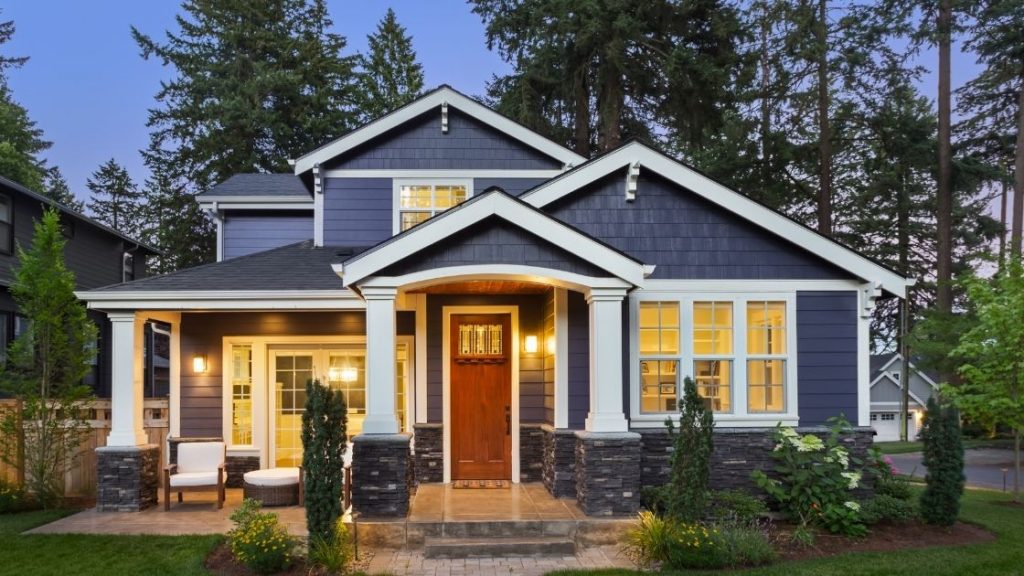If you’re interested in buying rental properties, investing in a fourplex can be an excellent choice. That’s because a fourplex strikes the perfect balance between affordability and scale.
Here’s what I mean.
When you invest in a fourplex (which is a building that has 4 separate units in it), you get the high income and other benefits of owning a multifamily building without the steep down payment and strict financing requirements needed for a multifamily investment.
This special dynamic can’t be found in any other real estate investment and it allows you to enjoy exceptional returns on investment.
But to take full advantage of this, you need to be willing to live in one of the units for a while.
Note: You can still invest in fourplexes even if you don’t want to live in one of the units and they can make fine investments that way too. But you just won’t be able to take advantage of some of the ridiculously good financing and low down payment options available for owner-occupants.
As promised, we will provide a step-by-step guide to buying a fourplex. If you want to skip ahead to that part of the article, just click on the link above.
But to give you better context on fourplex investing, we will also cover a lot more more, including the following:
- What is a Fourplex?
- How Much Does It Cost to Buy a Fourplex?
- Is a Fourplex Considered Commercial Real Estate?
- Can I Finance a Fourplex?
- How Much Down Payment Do I Need to Buy a Fourplex?
- Can I Buy a Fourplex With No Money Down?
- Do I Have to Live in a Fourplex?
- How Do I Know if a Fourplex Is a Good Investment?
- Pros and Cons of Owning a Fourplex
That’s a lot to cover, so let’s get into it!
This post may contain affiliate links. If you click on a link and complete a transaction, I may make a small commission at no extra cost to you.
The information contained in this post is for informational purposes only. It is not a recommendation to buy or invest, and it is not financial, investment, legal, or tax advice. You should seek the advice of a qualified professional before making any investment or other decisions relating to the topics covered by this article.
Step-By-Step Guide to Buying a Fourplex
Get Your Financial House in Order
The first step in buying your fourplex is getting your financial house in order.
That includes saving your down payment and making sure your credit is in good shape (you will need at least a 580 credit score to qualify for the FHA’s 3.5% down payment option).
For some great ideas on how to come up with a down payment (with tips on how to do it fast) and improve your credit, check out my article on how to buy your first rental property.
Find a Great Real Estate Agent
Second, find a great real estate agent.
The fact that fourplexes qualify as residential properties (and not commercial properties, like apartments, office buildings, strip malls, etc.) makes finding a real estate agent for fourplexes much easier than say, an apartment building. Most real estate agents specialize in residential properties, not commercial properties.
If this is your first rental property investment, you will need an experienced agent to guide you through the process.
Find one that has at least 5 years in the industry, deep familiarity with the neighborhood you are considering, experience working with real estate investors (including people buying small multi-unit properties, like fourplexes), and good rapport with you.
Let the agent know your plans and convince them of how serious you are.
If you have the down payment in hand, your credit is in good shape, and you have a well-thought-out strategy to buy your fourplex, this will show the agent that you are a ready, willing and able buyer.
Select Your Target Markets
With the help of your real estate agent, you should figure out what neighborhoods you want to target. If this is your first rental property, you may want to stick to areas near you (all of my properties are within 15 minutes of my house, which really makes everything easier).
Some additional factors you should consider are:
1. Reputation and overall desirability of the neighborhood (good school districts are a plus)
2. Population and jobs are stable or growing
3. A robust tenant population exists
One fantastic resource to help you select the right area is Mashvisor. They allow you to search a city and immediately get an overview of the investment potential.
Using their tools, you can:
- Pull average returns for traditional rental investing as well as for Airbnb.
- See how many properties are in that city.
- Find out key information, like average income, home price, Airbnb occupancy rate, and the optimal strategy for that neighborhood.
- Run searches on potential properties based on the criteria you provide (including fourplexes).
Pretty powerful tool.
If you want to access their services, you can use my promo code AFF15 for a 7-day free trial of Mashvisor in addition to a 15% discount forever on subscriptions to any Mashvisor plan.
Analyze Potential Fourplexes
Now that you have selected your target markets, you are going to be looking at actual fourplexes in those areas. A good rule of thumb as you look at properties is asking yourself whether you could picture living there (because you will be!). If not, chances are good that prospective tenants may feel the same way.
At this time, you may also want to start the mortgage application process, including obtaining a pre-approval letter.
Your agent may know of a good lender or mortgage broker. Or you can find one yourself by doing a simple search online.
Back to the topic at hand:
A lot of factors go into analyzing whether a fourplex is a good investment, but one of the most important factors is figuring out its “cash flow.”
Cash flow is simply income minus expenses. In the case of a fourplex, income it will be almost all rent, although you may occasionally get application fees, late fees, etc. As for expenses, these will include your mortgage payment, property taxes, insurance, and any other expenses that you pay in connection with the property.
To get as accurate a view as possible, I would calculate cash flow assuming all 4 units will be rented out (even though you will be living in one). If it cash flows on this basis, you can feel pretty good about it being a solid investment.
If the cash flow from the 3 units is enough to cover the expenses of the property, even better. That means you get to live in one of the units for free.
So how do you determine cash flow? Perhaps the most important part of that calculation is the expected rent. There is no method to perfectly predict expected rent, but a great place to start is with your real estate agent.
Your agent can pull for you “rental comps” which are basically a history of rentals in the area that are similar to the units in your fourplex. You can get a pretty good sense of the rent that your units will generate based on those comps.
Another option is to go to Zillow’s “Rent” tab and run a search of the property’s ZIP code. The results may include rental listings for properties that are similar to yours in size, bedrooms, etc.
Sites like rent-o-meter can also be a fine source for rental estimates.
Any of these methods (or better yet, using all three in combination) should give you a pretty accurate idea of your expected rent.
Your estimated expenses should be easy to calculate.
As mentioned above, they are going to include your mortgage payment, property tax, and property insurance, all of which generally get rolled into a single payment that you make to the lender. If you go to Zillow, they can provide an estimate of your expenses for any property you type in.
Once you have the estimated expenses and the projected rent, just subtract one from the other to determine if the property will cash flow.
Obviously, the more cash flow, the better. But cash flow is not the only factor you should consider when analyzing your purchasing decision. Take a good look at the demographics of the area, the local scene, whether there is a strong renter population, etc.
City-data.com is a pretty helpful (and free) resource for this type of information.
Make the Offer

Once you have identified the fourplex that you want to buy, you will want to make an offer. Your agent will guide you through that process. There is typically a negotiation on price and other terms, which can be nerve-wracking your first time around.
Even if you love the property, don’t get carried away and pay too much for it. This is an investment and you need to adopt a clinical approach when thinking about it.
Walk away if it’s not a fair deal or if you won’t meet your cash flow and other requirements.
Navigate Post-Contract Process and Closing
Once your offer is accepted and you enter into a sales contract, the clock really starts ticking. There may be inspections to do and you have to navigate the mortgage process.
An experienced agent has gone through this with hundreds of buyers and can help you navigate this process. You just need to take care of the myriad requests that are going to come your way.
Also, the settlement company that is going to handle your closing may ask you for documents and information to prepare for your closing.
At closing, you will be asked to sign a huge stack of documents (and of course hand over a check!). But at the end of it all, you will get a set of keys that will hopefully unlock a profitable future for you!
Common Questions About Fourplex Investing
What Is a Fourplex?
A fourplex (sometimes known as a quadplex) is a multi-unit building that contains four separate living units, with four distinct entrances.
How Much Does it Cost to Buy a Fourplex?

As with any real estate, the cost to buy an existing fourplex will depend on the size, location, features, and condition of the property.
Just for fun, I pulled listing prices for fourplexes in Cleveland Ohio on Zillow (I picked Cleveland at random). Thirteen came up.
The average price was a little over $127,000 and the median price was $140,000.
The lowest-priced fourplex was $45,000 and the highest priced one was $214,000.
Obviously, more expensive areas will command higher prices and vice versa. But doing a simple Zillow search for multifamily properties in your neighborhood and then looking for those that have 8 bedrooms (4 units, with 2 bedrooms each is a common configuration) should give you a pretty good sense of the prices in your area.
Is a Fourplex Considered Commercial Real Estate?
For purposes of FHA loans (which are loans insured by the Fair Housing Administration), a fourplex is considered a residential property, not a commercial property. It will, therefore, qualify for FHA loans, which offer amazing low-down-payment options (more on that later).
You can buy duplexes and triplexes too, and they will also be considered residential, but a fourplex has the maximum number of units you can have and still qualify for residential property treatment under an FHA loan.
To maximize the benefit of FHA financing, a fourplex is where you want to be.
Can I Finance a Fourplex?
You can finance a fourplex.
The best way to boost your ROI on a fourplex investment is by financing the purchase of your fourplex with an FHA loan. These types of loans allow owner-occupants the ability to buy a residential property for only 3.5% down. The applicant must also have a credit score of 580 or better and meet some other basic requirements. Source: Zillow
If you do not want to live in any of the units, you can get conventional financing, but you will need to pay a substantially higher down payment.
How Much Down Payment Do I Need to Buy a Fourplex?
As stated, if you purchase a fourplex with an FHA owner-occupant loan, you will only need 3.5% of the purchase price as a down payment.
So on a $100,000 fourplex, you would only need a down payment of $3,500. There are closing costs and other expenses as well, so you will want to account for that too.
Can I Buy a Fourplex With No Money Down?
You can buy a fourplex with no money down. Many down payment assistance programs will provide you the 3.5% needed to cover your FHA loan down payment amount. These include the Chenoa Fund and many state-sponsored programs.
If you can’t qualify for these down payment assistance programs or prefer a different approach, there are other strategies you can use to get into your fourplex with no money down.
If you want to learn more, check out my article on 15 no money down real estate strategies.
Do I have to Live in a Fourplex?
If you want to take advantage of the 3.5% down payment option offered by an owner-occupied FHA loan, you must live in the fourplex.
If you are buying it purely for investment purposes and do not want to use an FHA loan, you do not need to live in the fourplex (but may need to meet more stringent lender requirements, such as higher down payments, stricter credit score cut-offs, etc.).
How Do I Know if a Fourplex Is a Good Investment?

A fourplex is a good investment if it meets your investing criteria. For me, I require a 10% ROI to even consider buying a rental property.
In other words, if I put $40,000 down, I will want at least a $4,000 return on my money each year. That return could include cash flow (which is just income minus expenses), appreciation, and mortgage reductions.
That’s a minimum threshold for me – you should try to find deals that can do better.
If you want more traditional measures of real estate investment performance, here are some rules of thumb that you can use:
The 2% Rule: This is basically dividing the monthly rent by the purchase price.
So let’s say your fourplex has total rents equal to $4,000 and you paid $150,000 for it. If you use the above formula, you wind up with 2.6%. That’s bigger than 2%, so the investment meets the 2% rule. In general, the higher the percentage, the better.
The 1% Rule: This is the same as the 2% rule, but instead of using 2% you use 1%. In markets like mine, where prices tend to be higher relative to rents, you just won’t find deals that meet the 2% rule. In that case, you can use the 1% rule.
The 50% Rule: This is a rule of thumb that is often used by multifamily investors to predict whether a property will cash flow. You take the rent and cut it in half. You are assuming that your expenses will be half of your rent.
What you have leftover is what you can use to pay your mortgage. If there is anything left over after paying your mortgage, that would be your estimated cash flow. If you have decent cash flow after slashing your rents in half and paying off your mortgage, then you have satisfied the 50% rule.
Pros and Cons of Owning a Fourplex
Before you jump into buying a fourplex, you should be aware of the pros and cons of owning a fourplex, so you can get a more complete picture of what’s involved.
The pros of owning a fourplex are as follows:
- Lower overall cost than apartments
- Favorable financing options (incl. low down payments)
- Diverse rental income sources
- High potential ROI
- May be able to live for free in one of the units
- Centralized maintenance (one roof, one exterior, one lawn, etc.)
- Scalability (can grow quickly 4 units at a time)
Cons of Owning a Fourplex
- Tenant Interaction (tenants can knock on your door to complain)
- Concentration Risk (your units are in one building, so if there is a decline in the neighborhood, for example, all of them will be affected)
- Fourplexes are less common than single family homes, so they may be harder to buy and sell
- Fourplexes are more intimidating than buying and managing a single-family rental property
Conclusion
Buying a fourplex can be a profitable but controlled way to start investing in real estate. By living in the building you can keep a keen eye on your investment and learn the ins and outs of managing a rental property.
Once you get the hang of it, you can rinse and repeat.
Getting your first fourplex may be challenging, but it can provide you with a superior investment and set you on the path toward financial freedom.
The second fourplex will be much easier. If you keep at it, you will be on your way to owning a rental property empire that can generate strong monthly cash flow and great returns over time.

